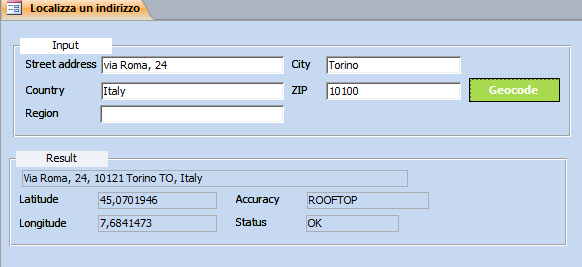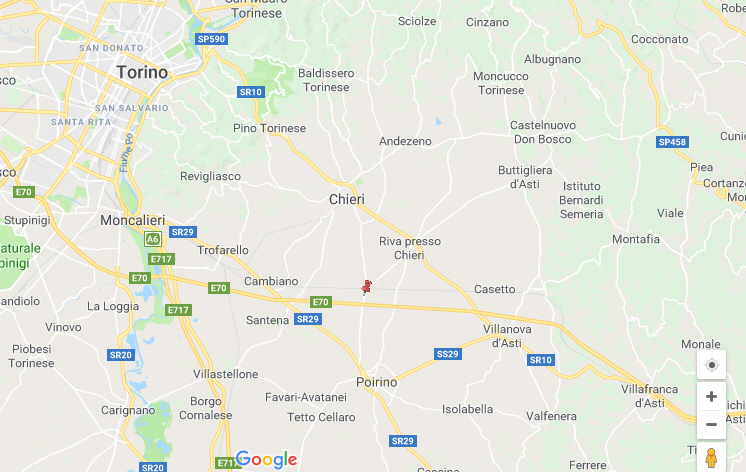Ever wondered to get GPS Latitude and Longitude with Geocoding and Microsoft Access? If you want to enrich a table with GPS Latitude and Longitude it is not so complex, nor so time consuming: you just need the right VBA procedures and functions. Stay with me and you will improve your Access database!
Let’s start describing the user interface. I have a form like this:
In the input section you fill in the address you are looking the coordinates for.
The textboxes are named:
- txtAddress
- txtCity
- txtCountry
- txtZipCode
- txtRegion
The command button is named: cmdGeocode
In the result section you will see the coordinates, if found.
The textboxes are named:
- txtRetAddress
- txtLatitude
- txtLongitude
- txtAccuracy
- txtStatus
And now the VBA. All the magic is managed by the Geocode command button.
1. Create a new module. (Open Microsoft Visual Basic Editor ALT+F11, then from the menu bar Insert – Module)
2. At the beginning create a public type. It will be used later to store coordinates:
Public Type tGeocodeResult dblLatitude As Double dblLongitude As Double strRetAddress As String strAccuracy As String strStatus As String End Type
3. Create the function to get coordinates from Google
Important. The code was created many years ago by Philben. Unfortunately the site is no more available and I regret not to be able to personally give credits to Philben: Philippe, je suis désolé de ne pas pouvoir te remercier!
'---------------------------------------------------------------------------------------
' Procedure : Geocode with Google Geocoding API v3
' Version : 1.01
' DateTime : 03/03/2011
' Author : Philben
' Purpose : converting addresses into geographic coordinates
' Parameter : No mandatory. string format or NULL
' Reference : http://code.google.com/intl/fr-FR/apis/maps/documentation/geocoding/index.html
' Remark : Query limit of 2,500 geolocation requests per day
' : A good accuracy is different of a good geocoding !!!
' : Minimum delay between two queries : >= 200 ms
'---------------------------------------------------------------------------------------
Public Function Geocode(Optional ByVal vAddress As Variant = Null, _
Optional ByVal vTown As Variant = Null, _
Optional ByVal vPostCode As Variant = Null, _
Optional ByVal vRegion As Variant = Null, _
Optional ByVal sCountry As String = "ITALY") As tGeocodeResult
On Error GoTo myErr
Dim oXmlDoc As Object
Dim sUrl As String, sFormatAddress As String
If Not IsNull(vAddress) Then vAddress = Replace(vAddress, ",", " ")
sFormatAddress = (vAddress + ",") & _
(vTown + ",") & _
(vRegion + ",") & _
(vPostCode + ",") & _
sCountry
'To create the URL
sUrl = "http://maps.googleapis.com/maps/api/geocode/xml?address=" & sFormatAddress & "&sensor=false"
''XMLDOM to get the XML response
Set oXmlDoc = CreateObject("Microsoft.XMLDOM")
With oXmlDoc
.Async = False
If .Load(sUrl) And Not .selectSingleNode("GeocodeResponse/status") Is Nothing Then
'Status code
Geocode.strStatus = .selectSingleNode("GeocodeResponse/status").Text
'If a result is returned
If Not .selectSingleNode("GeocodeResponse/result") Is Nothing Then
'formatted_address
Geocode.strRetAddress = .selectSingleNode("//formatted_address").Text
'Accuracy
Geocode.strAccuracy = .selectSingleNode("//location_type").Text
'Latitude and longitude
Geocode.dblLatitude = Val(.selectSingleNode("//location/lat").Text)
Geocode.dblLongitude = Val(.selectSingleNode("//location/lng").Text)
End If
End If
End With
Set oXmlDoc = Nothing
Exit Function
myErr:
Set oXmlDoc = Nothing
Err.Raise Err.Number, , Err.Description
End Function
4. On the cmdGeocode command button click event paste this code:
On Error GoTo myErr Dim tGeo As tGeocodeResult 'Start geocoding tGeo = Geocode(PrepareAddress(Me.txtAddress), PrepareAddress(Me.txtCity), _ PrepareAddress(Me.txtZipCode), PrepareAddress(Me.txtRegion), _ PrepareAddress(Me.txtCountry)) 'Display results With tGeo Me.txtRetAddress = .strRetAddress Me.txtLatitude = .dblLatitude Me.txtLongitude = .dblLongitude Me.txtAccuracy = .strAccuracy Me.txtStatus = .strStatus End With myEnd: Exit Sub myErr: MsgBox Err.Number & vbCrLf & Err.Description, vbExclamation Resume myEnd
In short using Geocode function I assign to tGeo all the data that Google API returns.
And finally I assign to each of the output textboxes the values.
As you see in the code there is also a nested function, PrepareAddress, required to remove diacritics from the input textboxes. For this function my credits are to R. Dezan.
Private Function PrepareAddress(ByVal vText As Variant) As Variant ' R. Dezan Const csIn As String = "ÀÁÂÃÄÅÈÉÊËÌÍÎÏÑÐÒÓÔÕÖÙÚÛÜÝŸÇ" Const csOut As String = "AAAAAAEEEEIIIINOOOOOOUUUUYYC" Dim i As Long, j As Long Dim sText As String If Not IsNull(vText) Then sText = UCase(vText) For i = 1 To Len(sText) j = InStr(1, csIn, Mid$(sText, i, 1), vbBinaryCompare) If j Then Mid$(sText, i, 1) = Mid$(csOut, j, 1) Next i PrepareAddress = CVar(Replace(Replace(sText, "Œ", "OE"), "Æ", "AE")) End If End Function
Now what next?
At least 3 more steps:
1) You store the coordinates into a table, or even better, you can loop through all the records already existing in the table and call the Geocode procedure and update the records to fill Longitude and Latitude.
2) you create a KML file with the data
3) You upload the KML file to your places in Google Maps
This will be covered in another post.
Enjoy it!


